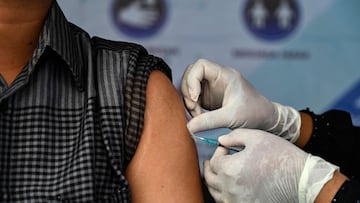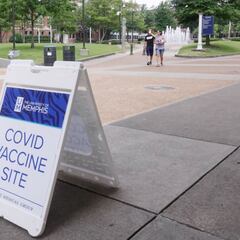Can you do exercise before or after getting a covid-19 vaccine?
The national vaccination effort is a central part of the White House's pandemic strategy and studies suggest that exercising can actually boost the vaccine's effectiveness.


For lots of people exercise has been a vital release throughout the pandemic, with many taking up running or investing in some home equipment to stave off boredom during lockdown.
If you’ve got into the routine of having regular exercise then you may be worried about how getting a covid-19 vaccine will affect you. Good news – health experts agree that there is no reason not to undertake physical activity before or after receiving a dose, provided you feel well enough to do so.
Jamie Alan, an associate professor of pharmacology and toxicology at Michigan State University, has said that you can “absolutely” exercise before getting vaccinated.
Read more
- Vaccines greatly reduce the risk of the delta variant
- New study suggests that J&J covid-19 vaccine recipients should get a booster
- How dangerous is the delta variant to children and young people?
Furthermore Stacey Rose, assistant professor of internal medicine and infectious diseases at the Baylor College of Medicine in Texas, adds that exercise can lessen the feeling of soreness in the arm that sometimes accompanies vaccinations. She says it’s “probably better to exercise using the muscles where the vaccine is given” to help soothe any discomfort.
Studies show that exercise can help prompt immune response
The Centers for Disease Control and Prevention (CDC) have issued no warning against exercise after the covid-19 vaccine, and some studies have even suggested that exercise can help. In 2013 medical journal Human Vaccines & Immunotherapeutics found that “acute bouts” of exercise, like doing a work out before receiving a vaccine, can actually boost your body’s immune function.
In terms of the link between exercise and the covid-19 vaccine specifically, no research has yet been carried out on how it may affect the vaccine’s efficacy. But the author of that Human Vaccines & Immunotherapeutics study, Kate M. Edwards, told VeryWell that it may well help.
COVID-19 vaccine inventor describes feeling helpless as people opt-out of shot: "I don't have the words" https://t.co/s31RtpFyKA pic.twitter.com/KYrTajpNdw
— The Hill (@thehill) July 24, 2021
“Research has shown that exercising—15 minutes, moderate intensity, resistance exercise—before receiving other vaccines is safe, might actually reduce some of the symptoms of vaccine reactions, and boost your immune response,” she said.
She adds that “exercise activates your immune system, bringing more cells into the blood,” which may in turn help your body to respond more efficiently to the vaccine.
Related stories
Looking at the long-term, people who regularly exercise are thought to be less likely to become seriously ill after catching covid-19. A study in the British Journal of Sports Medicine split a test group into three categories; defined by how regularly they exercised on a weekly basis.
Of the 48,000 patients included in the study, researchers were able to conclude that “people who were consistently inactive had a significantly higher risk of hospitalization, ICU admission, and death after getting covid-19.”

